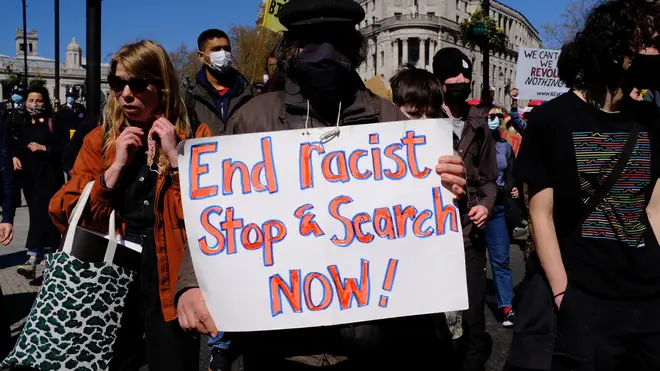
Rachel Johnson 7pm - 10pm
20 April 2022, 12:49 | Updated: 20 April 2022, 14:52

The use of stop and search powers in England and Wales must be overhauled and the disproportionate impact on ethnic minority groups addressed, a watchdog has said.
An Independent Office for Police Conduct (IOPC) review found, in the year to March 2021, black people were seven times more likely to be stopped and searched than white people.
Asian people were two-and-a-half times more likely.
The report included one case study of a black boy who was searched more than 60 times between the ages of 14 and 16, sometimes more than once in the same day.
READ MORE: Boris 'orders Tories to block new Partygate probe' as he defies calls to quit
READ MORE: Workers who stayed behind at Ukraine zoo to help animals 'shot dead by Russians'
IOPC lead on discrimination Sal Naseem called on police chief to "break the cycle".
"It cannot be underestimated how traumatic a stop and search encounter can be on an individual," he said.
"If carried out insensitively, a person can be left feeling humiliated and victimised."
The IOPC said force, in particular handcuffs, must not be used as standard during searches.
It highlighted an example where a 12-year-old boy with a plaster cast on one arm was handcuffed while out running an errand for his mother.
The child was restrained within 20 seconds of the officer leaving his patrol car.

Racism in the police 'a real problem' says Shabnam Chaudhri
Mr Naseem added that these incidents can be the "first interaction" some young people have with police and "if it is a negative one, this can have a lasting impact on that person and the trust they put in the police".
The IOPC also called on police chiefs to "reduce their officers' reliance on the smell of cannabis alone" when deciding whether to carry out a search.
It said the Home Office should review what are considered reasonable grounds for suspicion for cannabis possession, and whether any changes are needed to police powers.
Current guidelines say it is not good practice for an officer to rely on one factor alone when deciding whether to search someone, particularly if it is difficult to attribute to one person.
The IOPC said: "In some of our investigations, the smell of cannabis has either formed the sole grounds given for a stop and search, or it has been the main reason for suspicion alongside either weak, non-specific concerns about behaviour, or vague intelligence relating to geographical location.
"These examples reinforce an often-held perception that the smell of cannabis is being used as an excuse to conduct a stop and search, especially when no cannabis is then found on the individual."

Nick Ferrari absolutely repulsed by Met Police's child strip search
Its recommendations included:
Police in England and Wales carried out 695,009 stop and searches in the year to March 2021, 77 per cent of which resulted in no further action.
Although forces often cite the powers as useful for taking weapons off the streets, 478,576 of the searches were for drugs, up 36 per cent on the previous year.